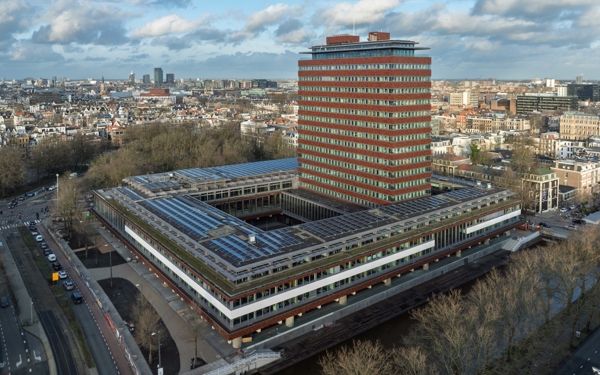Answer:
1.Question: what requirements are made by the Wft and other supervision legislation in respect of the activities of a representative office in the Netherlands?
Answer: the Wft does not impose a specific requirements in respect of market access by or the conduct of business of a representative office in the Netherlands of a bank established outside the Netherlands, provided that this representative office does not in any way carry on the business of credit institution in the Netherlands or perform other financial services for which specific requirements are imposed in the Wft. This means that a representative office should, in principle, confine itself to functioning as a ‘listening post’ for the foreign bank it represents. The representative office may not therefore perform any activities for which registration in the register of money transaction offices is required under the Wgt. Similarly, the other prohibitions in the Wft, the Wgt and other supervision legislation such as the Trust Offices Supervision Act (Wet toezicht trustkantoren / Wtt) are applicable to representative offices.
2. Question: may a representative office gather information in the Netherlands?
Answer: yes, provided that this cannot wrongly give the Dutch public the impression that the representative office is a bank (or admitted branch of a bank) that is licensed to operate in the Netherlands and subject to supervision in the Netherlands. Nor may the Dutch public wrongly be given the impression that the representative office is a money transaction office entered in the Wgt register.
3. Question: may a representative office perform market fact-finding and market research activities, for example to assess the possibility of setting up a branch or a money transaction office in the Netherlands?
Answer: yes, provided that this cannot wrongly give the Dutch public the impression that the representative office is a bank (or admitted branch of a bank) that is licensed to operate in the Netherlands and subject to supervision in the Netherlands. Nor may the Dutch public wrongly be given the impression that the representative office is a money transaction office entered in the Wgt register.
4. Question: may a representative office keep in contact with other banks and/or professional market parties?
Answer: yes, provided that this cannot wrongly give the Dutch public the impression that the representative office is a bank (or admitted branch of a bank) that is licensed to operate in the Netherlands and subject to supervision in the Netherlands.
5. Question: may a representative office make advertisements aimed at the public in the Netherlands for the financial services of its head office? And may a representative office provide commercial information to the public in the Netherlands about the financialservices of its head office?
Answer: yes, provided that this cannot wrongly give the Dutch public the impression that the representative office is a bank (or admitted branch of a bank) that is licensed to operate in the Netherlands and subject to supervision in the Netherlands. Nor may the Dutch public wrongly be given the impression that the representative office is a money transaction office as entered in the Wgt register.
6. Question: may a representative office deposit (or cause to be deposited) redeemable funds of the public in the Netherlands in its account or otherwise take receipt of such funds?
Answer: no, this is contrary to the prohibition of section 3:5 (1) Wft. This section provides that it is prohibited to invite, receive or have redeemable funds in the operation of a business outside a restricted circle from parties other than professional market parties in the Netherlands (prohibition on inviting funds).
7. Question: may a representative office transfer redeemable funds of the public through a correspondent bank to its head office or to another bank in the Netherlands or elsewhere?
Answer: no, this is contrary to the prohibition in section 3:5 (1) Wft as referred to in answer 6, namely the prohibition on inviting, receiving or having redeemable funds of – in short – the public.
8. Question: may a representative office open current accounts and/or savings accounts?
Answer: no, these activities are reserved to banks licensed to operate in the Netherlands or branches of banks established outside the Netherlands that have been admitted to the Netherlands (i.e. notified or licensed branches of banks).
9. Question: may a representative office assist or be involved in opening accounts for clients in the Netherlands or at a bank in the Netherlands or elsewhere or in issuing bank cards or credit cards and/or the accompanying pin codes?
Answer: no, since this could wrongly give the Dutch public the impression that the representative office is a bank licensed to operate in the Netherlands (or an admitted branch of such a bank) and is therefore subject to supervision in the Netherlands.
10. Question: may a representative office in the Netherlands perform one or more of the 14 activities referred to in Annex I to the recast Banking Directive (no. 2006/48/EC)?
Answer: no, this is not permitted. The right to perform one or more of the activities referred to in Annex I to the recast Banking Directive (no. 2006/48/EC) is reserved, in so far it concerns a bank established in the Netherlands (or a branch of such a bank), to a bank licensed to operate in the Netherlands (or an admitted branch of such a bank) which is subject to supervision in the Netherlands. If such banking activities were to be performed by a Netherlands-based representative office of a bank established outside the EEA, this representative office would act in contravention of the prohibition contained in section 2:20 (1) 1 Wft. A provision specifically applicable to a representative office of a bank which is established in another EEA state and has obtained a banking licence from the supervisory authority of that other EEA state is that this office may perform one or more of the activities referred to in Annex I to the recast Banking Directive (no. 2006/48/EC) only after this office has been notified as a branch. It follows from section 2:15 (2) Wft that this notification must state which of these banking activities the branch intends to perform in the Netherlands. See also the answer to question 14 below.
See part D of this information pack for the list of activities as referred to in Annex I to the recast Banking Directive.
11.Question: may a representative office use the work ‘bank’ or translations or forms thereof?
Answer: no, under section 3:7 (1) Wft it is prohibited to use the word ‘bank’ or translations or forms thereof in the name or in the course of the business. On request, DNB may grant an exemption from the prohibition under section 3:7 (4) Wft if the objects of the prohibition can be achieved in some other way. DNB may attach conditions to the granting of such an exemption. There is only one specific exception: the prohibition on the use of the word ‘bank’ does not apply to representative offices of a bank which is established in another EEA member state and has obtained a banking licence from the supervisory authority of that member state.
12. Question: may a representative office have contact with the public with a view to concluding, attempting to conclude or handling banking transactions or performing money transactions?
Answer: no, this is contrary to the provisions in the supervision legislation, since such activities are reserved to banks licensed to operate in the Netherlands (or admitted branches of such banks).
Money transactions (or acting as an intermediary in such transactions) is reserved in the Netherlands to the parties referred to in section 3 (2) Wgt (such as registered money transaction offices and banks licensed to operate in the Netherlands (and branches of such institutions)).
13. Question: may a bank licensed in another EEA member state which has given notification for the purpose of providing cross-border services also have a representative office in the Netherlands?
Answer: yes, provided that the cross-border activities in the Netherlands are not in any way performed through the intermediary of the representative office. If the banking activities do take place through the intermediary of the representative office, the bank concerned should give notification for a branch in the Netherlands.
14. Question: may a bank established in another EEA member state which has given notification for the purpose of setting up a branch in the Netherlands – or a bank established in a country that is not a member state of the EEA and which has a licensed branch in the Netherlands – also have a representative office in the Netherlands?
Answer: the presence in the Netherlands of both a branch and a representative office of the same bank may be confusing to the Dutch public. The presence of both types of office in the Netherlands is permitted only if the public cannot wrongly form the impression that the representative office is authorised to perform the activities reserved to the branch. This means that the activities of the representative office and the branch must remain strictly separated and that the representative office may in no way be involved in activities reserved to the branch.
15. Question: may a representative office perform money transactions or actively engage in the conclusion of money transactions?
Answer: under section 3 of the Wgt an organisation is prohibited from operating as a money transaction office unless it has been entered in the register of money transaction offices. This means that it is prohibited to perform money transactions (such as the exchange of coins or banknotes or money transfers) or to be involved in the conclusion of money transactions.
16.Question: may a representative office provide intermediary services for or advise onfinancial products or financial instruments?
Answer: no, this is contrary to the prohibitions in the supervision legislation, namely the prohibition on providing intermediary services in the Netherlands in relation to financial products such as insurance, loans, investments and so forth without a licence from the Netherlands Authority for the Financial Markets (section 2:80 Wft) and the prohibition on advising on financial products other than financial instruments (section 2:75 Wft) without a licence from the Netherlands Authority for the Financial Markets. As regards the provision of advice on financial instruments or the provision of other investment services or the performance of investment activities, reference is made to the duty of investment firms to obtain a licence under section 2:96 Wft. For questions on this subject please contact the Netherlands Authority for the Financial Markets on telephone number 0900-6800680 (35 cents per call) on working days between 8 a.m. and 5 p.m.


